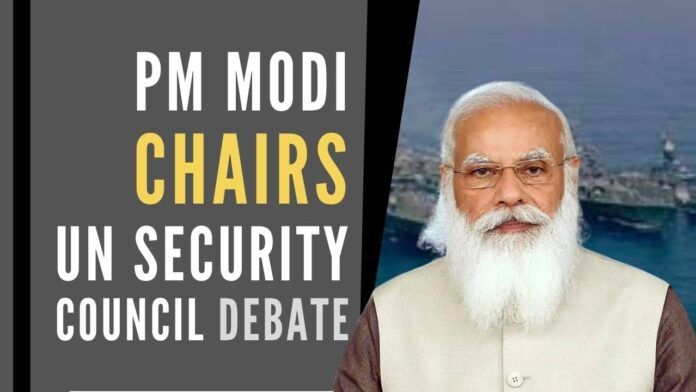
PM Modi: 5 principles needed for global maritime security
Reiterating on enhancing maritime security, Prime Minister Narendra Modi on Monday called for peaceful settlement of disputes as per international law and for jointly combating maritime threats posed by non-state actors as he chaired a high-level UN Security Council open debate. Addressing the debate on “Enhancing Maritime Security – A Case for International Cooperation” via video conferencing, Modi put forward five principles for inclusive maritime security strategy and mentioned India’s vision ‘SAGAR‘ for sustainable use of the oceans. Modi also emphasized that the oceans are the world’s common heritage and sea routes are the lifeline of international trade.
Underlining the fact that the countries’ shared maritime heritage is facing many challenges, the Prime Minister said, “We should remove barriers for legitimate maritime trade. Global prosperity depends on the active flow of maritime trade. Any hindrance in maritime trade can threaten the global economy.” The second principle, he said, was that the settlement of maritime disputes should be peaceful and on the basis of international law. “This is very important for mutual trust and confidence. This is the only way we can ensure global peace and stability,” he asserted.
PM Modi is the first Indian Prime Minister to preside over a UN Security Council Open Debate. He spoke in the Hindi language.
Modi said it was with this understanding and maturity that India resolved its maritime boundary issues with its neighbour Bangladesh. He said the third key principle was that the global community should jointly fight maritime threats posed by natural disasters and non-state actors and added that India has taken several steps to enhance regional cooperation in this regard. Preserving the maritime environment and maritime resources, and encouraging responsible maritime connectivity were the fourth and fifth principles enunciated by the prime minister. Modi is the first Indian Prime Minister to preside over a UN Security Council Open Debate. He spoke in the Hindi language. Modi’s speech can be heard from his Twitter handle:
Chairing the UNSC High-Level Open Debate on “Enhancing Maritime Security: A Case For International Cooperation”. https://t.co/cG5EgQNENA
— Narendra Modi (@narendramodi) August 9, 2021
The meeting was being attended by several heads of state and government of member states of the United Nations Security Council (UNSC), and high-level briefers from the UN system and key regional organizations. The open debate was focused on ways to effectively counter maritime crime and insecurity, and strengthen coordination in the maritime domain. The UN Security Council has discussed and passed resolutions on different aspects of maritime security and maritime crime in the past. However, this is the first time that maritime security was discussed in a holistic manner as an exclusive agenda item in such a high-level open debate.
Modi’s remarks in UNSC is published below:
Excellencies,
Maritime Security पर इस अहम चर्चा में जुड़ने के लिए आप सभी का धन्यवाद। मैं Secretary General के सकारात्मक संदेश और U.N.O.D.C. की Executive Director द्वारा briefing के लिए आभार व्यक्त करता हूँ। Democratic Republic of Congo के राष्ट्रपति ने African Union के अध्यक्ष के रूप में अपना संदेश दिया। मैं विशेष रूप से उनका आभारी हूँ। मैं रूस के राष्ट्रपति, केन्या के राष्ट्रपति, और वियतनाम के प्रधानमंत्री की उपस्थिति के लिए भी ह्रदय से आभार व्यक्त करता हूँ।
Excellencies,
समंदर हमारी साझा धरोहर हैं। हमारे समुद्री रास्ते international trade की लाइफ लाइन हैं। और, सबसे बड़ी बात यह है कि ये समंदर हमारे Planet के भविष्य के लिए बहुत महत्वपूर्ण हैं। लेकिन हमारी इस साझा समुद्री धरोहर को आज कई प्रकार की चुनौतियों का सामना करना पड़ रहा है। पायरेसी और आतंकवाद के लिए समुद्री रास्तों का दुरूपयोग हो रहा है। अनेक देशों के बीच maritime disputes हैं। और climate change तथा प्राकृतिक आपदाएं भी maritime domain से जुड़े विषय हैं। इस व्यापक संदर्भ में, अपनी साझा सामुद्रिक धरोहर के संरक्षण और उपयोग के लिए हमें आपसी समझ और सहयोग का एक framework बनाना चाहिए। ऐसा framework कोई भी देश अकेले नहीं बना सकता। यह एक साझा प्रयत्न से ही साकार हो सकता है। इसी सोच के साथ हम इस महत्वपूर्ण विषय को सुरक्षा परिषद के समक्ष ले कर आए हैं। मुझे पूरा विश्वास है कि आज की High Level चर्चा से विश्व को maritime security के मुद्दे पर मार्गदर्शन मिलेगा।
Excellencies,
इस मंथन को structure देने के लिए मैं आप के समक्ष पांच मूलभूत सिद्धांत रखना चाहूँगा।
पहला सिद्धांत: हमें legitimate maritime trade से barriers हटाने चाहिए। हम सभी की समृद्धि maritime trade के सक्रिय flow पर निर्भर है। इसमें आई अड़चनें पूरी वैश्विक अर्थव्यवस्था के लिए चुनौती हो सकती हैं। Free maritime trade भारत की सभ्यता के साथ अनादि काल से जुड़ा हुआ है। हजारों वर्ष पहले, सिंधु घाटी सभ्यता का लोथल बंदरगाह समुद्री व्यापार से जुड़ा हुआ था। प्राचीन समय के स्वतंत्र maritime माहौल में ही भगवान बुद्ध का शांति संदेश विश्व में फैल पाया। आज के संदर्भ में भारत ने इसी खुले और inclusive एथोस के आधार पर SAGAR – Security and Growth for All in the Region – का vision परिभाषित किया है। इस vision के जरिये हम अपने क्षेत्र में maritime security का एक inclusive ढांचा बनाना चाहते हैं। यह विजन एक Safe, Secure और Stablemaritimedomain का है। Free maritime trade के लिए यह भी आवश्यक है, कि हम एक दूसरे के नाविकों के अधिकारों का पूरा सम्मान करें।
दूसरा सिद्धांत: maritime disputes का समाधान शांतिपूर्ण और अंतर्राष्ट्रीय कानून के आधार पर ही होना चाहिए। आपसी trust और confidence के लिए यह अति आवश्यक है। इसी माध्यम से हम वैश्विक शान्ति और स्थिरता सुनिश्चित कर सकते हैं। भारत ने इसी समझ और maturity के साथ अपने पड़ोसी देश बांग्लादेश के साथ अपनी maritime boundary को सुलझाया है।
तीसरा सिद्धांत: हमें प्राकृतिक आपदाओं और non-state actors द्वारा पैदा किए गए maritime threats का मिल कर सामना करना चाहिए। इस विषय पर क्षेत्रीय सहयोग बढ़ाने के लिए भारत ने कई कदम लिए हैं। Cyclone, सुनामी और प्रदूषण संबंधित समुद्री आपदाओं में हम फर्स्ट रेसपोंडर रहे हैं। पायरेसी को रोकने के लिए भारतीय नौसेना 2008 से हिन्द महासागर में पैट्रोलिंग कर रही है। भारत का White Shipping Information फ्यूजन केंद्र हमारे क्षेत्र में साझा maritime डोमेन awareness बढ़ा रहा है। हमने कई देशों को Hydrographic Survey Support और समुद्री सुरक्षा में प्रशिक्षण दिया है। हिन्द महासागर में भारत की भूमिका एक Net Security Provider के रूप में रही है।
चौथा सिद्धांत: हमें maritime environment और maritime resources को संजो कर रखना होगा। जैसा कि हम जानते हैं, Oceans का climate पर सीधा impact होता है। और इसलिए, हमें अपने maritime environment को plastics और oil spills जैसे प्रदूषण से मुक्त रखना होगा। और over-fishing और marine poaching (पोचिंग) के खिलाफ साझा कदम उठाने होंगे। साथ ही, हमें ocean science में भी सहयोग बढ़ाना चाहिए। भारत ने एक महत्वकांक्षी “Deep Ocean Mission” launch किया है। हमने sustainable fishing को प्रोत्साहन देने के लिए भी कई पहले ली हैं।
पांचवा सिद्धांत: हमें responsible maritime connectivity को प्रोत्साहन देना चाहिए। यह तो स्पष्ट है कि समुद्री व्यापार को बढ़ाने के लिए infrastructure का निर्माण आवश्यक है। लेकिन, ऐसे infrastructure projects के development में देशों की फिस्कल sustainability और absorption capacity को ध्यान में रखना होगा। इसके लिए हमें उचित वैश्विक norms और standards बनाने चाहिए।
Excellencies,
मुझे विश्वास है इन पांच सिद्धांतों के आधार पर maritime security cooperation का एक वैश्विक roadmap बन सकता है। आज की open डिबेट की उच्च और सक्रिय भागीदारी यह दिखाती है कि यह विषय सुरक्षा परिषद के सभी सदस्यों के लिए महत्वपूर्ण है। इसके साथ, मैं एक बार फिर आप की उपस्थिति के लिए आपका आभार व्यक्त करता हूँ।
धन्यवाद।










